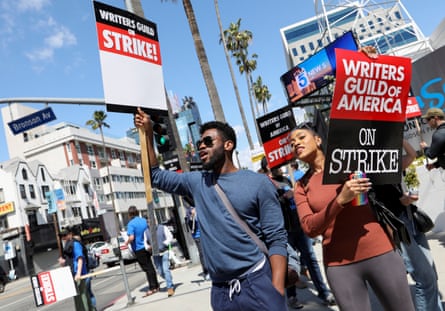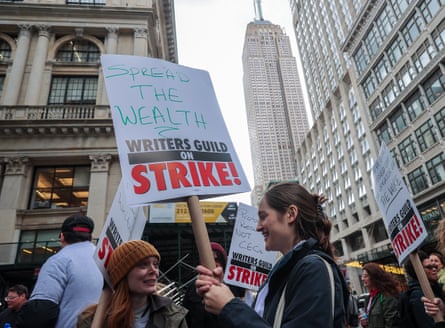Hollywood productions have ground to a halt after thousands of film and television writers went on strike following the breakdown of last-minute pay talks with major studios.
The Writers Guild of America (WGA) called its first stoppage in 15 years after failing to reach an agreement on higher pay, pitting its 11,500 screenwriters against old-guard companies, such as Universal, Paramount and Walt Disney, as well as tech newcomers, such as Netflix, Amazon and Apple.
The last industrial action, in 2007, lasted 100 days and cost the California economy an estimated $2.1bn as productions shut down and striking writers, actors and producers cut back on spending.
The WGA said the companies’ behaviour had “created a gig economy” that aimed to turn writing into an “entirely freelance” profession. “For the sake of our present and our future, we have been given no other choice,” it said.
In an interview with Deadline, the president of WGA West, Meredith Stiehm, said writers were facing “an existential threat”.
“We’ve been here for six weeks talking to them and those core proposals were literally ignored. And we made it very clear to them that 98% of our membership is demanding that we fight for something different, not just the usual negotiation that we’ve been having … and it just fell on deaf ears.”
WGA members began picketing outside Hollywood studios and in New York on Tuesday. By the afternoon in Los Angeles, writers in blue WGA t-shirts had turned out across the city.
“Fist up, pens down! LA is a union town!” writers chanted as they marched outside Amazon Studios in Culver City. One passing car after another honked in support as they rolled by.
Jonterri Gadson, who was leading the chant, had moved to Los Angeles in 2019 to fulfill her goal of becoming a comedy writer, and has worked on shows featuring Chris Rock, Kelly Clarkson, and Amy Poehler and Nick Offerman.
“It is a dream and I want that dream to pay me a livable wage,” Gadson said.

Among the more than 150 people marching outside Amazon was Erika L Johnson, who was a Hollywood assistant during the lengthy writers strike in 2007.
This time, “we’re hoping it’s short. There’s no way to know,” Johnson said. “No one wants it to go long, but we are prepared to do what we need to do.”
Johnson said she was particularly concerned about the proliferation of “mini rooms,” smaller writers’ rooms devoted to working on scripts before shows are being produced, or even greenlit, which often translates into less money and less stability for the writers involved.
Many of the striking writers had used their guild signs to make jokes and film references: “Stop trying to make freelance happen,” “Revenge of the nerds,” and “Y’all Parks and Wrecked this contract.”
Some focused on writers’ concerns about the coming use of AI in the industry: “Alexa will not replace us!” one sign pledged. A few signs riffed on the same theme: “Hey studios: we have some notes!”
Writing can be lonely work, Gadson said, which made her appreciate the energy on the picket line. “It feels good to know that we are all fighting together, that we won’t be alone in this,” she said.
In New York, Greg Iwinski, a writer with credits on shows for Stephen Colbert and Jon Oliver, said the WGA strike was necessary because the streaming services had tried to divorce writers from what they knew best – how to connect to an audience.
“There’s a lot of built-up wisdom in television and in Hollywood, and it’s been efficient and profitable for years,” he said. “The streamers came in and tried to stress-test how little labour it takes to make entertainment and to separate artists from their own success and employment.”
The Alliance of Motion Picture and Television Producers (AMPTP), which represents the studios, said late on Monday that it had offered “generous increases in compensation” to writers, but that the two sides had been unable to reach a deal.
It said producers had been prepared to increase their offers of higher pay and residuals, but had been “unwilling to do so because of the magnitude of other proposals still on the table” – such as a requirement that companies employ a certain number of writers for a specified period of time on a show, “whether needed or not”.
Writers say they have suffered financially during the TV streaming boom, partly because of shorter seasons and smaller residual payments. According to WGA statistics, half of TV series writers now work at minimum salary levels, compared with one-third in 2013-14. Median pay at the higher writer/producer level has fallen 4% over the last decade.
For viewers, the most immediate effects of the strike will be felt on late-night talk and sketch shows. All of the top late-night shows, which use teams of writers to come up with their topical jokes, immediately went dark, including The Tonight Show with Jimmy Fallon, Jimmy Kimmel Live and The Late Show with Stephen Colbert, which use teams of writers to come up with their content.
Saturday Night Live, which had been scheduled to air a new episode Saturday, will also go dark and air reruns instead.
“Everyone including myself hope both sides reach a deal. But I also think that the writers’ demands are not unreasonable,” host Stephen Colbert said on Monday’s Late Show.
“This nation owes so much to unions,” Colbert said. “Unions are the reason we have weekends, and by extension why we have TGI Fridays.”
At Monday night’s Met Gala, Fallon said he wanted to see a fair deal agreed for writers. “I need my writers real bad, I got no show without my writers,” he said.

Further ahead, the strike could lead to a delay of the autumn TV season, for which writing normally starts in May or June. If the strikes continue, the networks will increasingly fill their programming lineups with unscripted reality shows, news magazines and reruns.
Media companies are facing a tough economic backdrop. Conglomerates are under pressure from Wall Street to make their streaming services profitable after investing billions of dollars in programming to attract subscribers. Last year, Netlix’s market value tumbled by almost $45bn after it predicted a drop in new subscribers.
Meanwhile, the rise of streaming has led to declining television ad revenue as traditional TV audiences shrink and advertisers go elsewhere.
The WGA also wants safeguards to prevent studios from using AI to generate new scripts from writers’ previous work, and writers want to ensure they are not asked to rewrite draft scripts created by AI.
Other entertainment industry unions, including the actors’ union SAG-AFTRA and the Directors Guild of America – which are both scheduled to negotiate with the AMPTP in the near future – have issued statements of support. In the UK, the Writers’ Guild of Great Britain (WGGB) advised its members not to work on projects in the jurisdiction of the WGA for the duration of the strike.

 1 year ago
70
1 year ago
70










 English (US)
English (US)